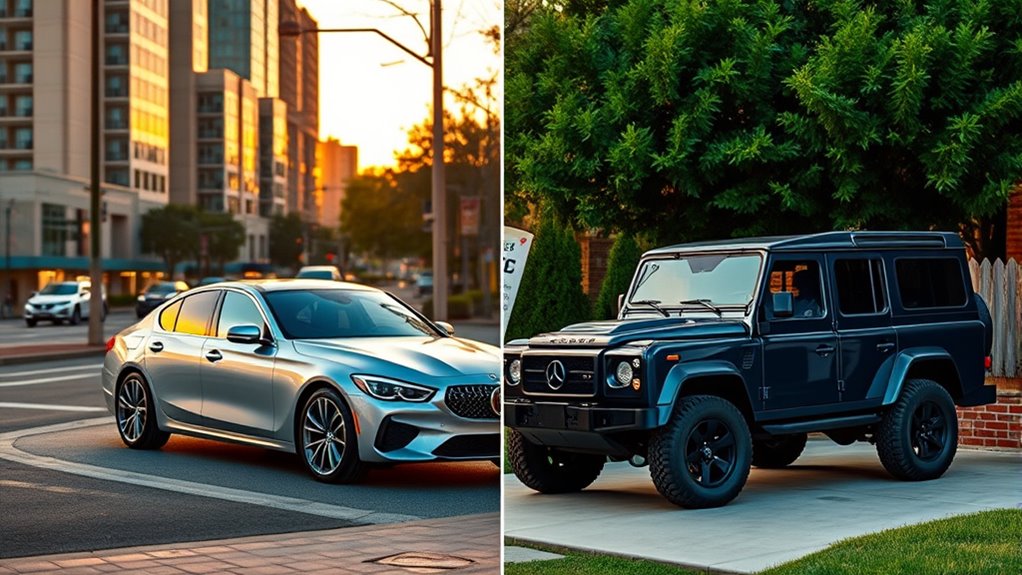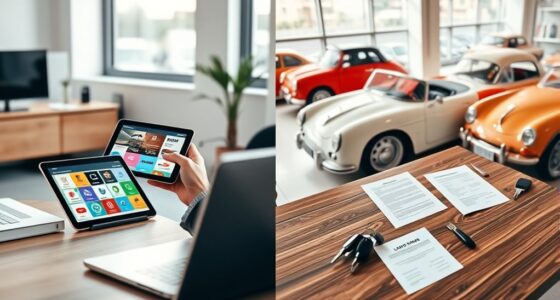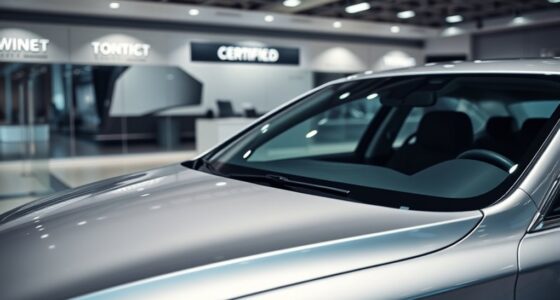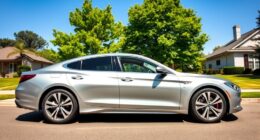If you prefer driving a new vehicle every few years and want lower monthly payments, leasing is ideal for models like luxury cars, sedans, and SUVs. It’s also a smart choice if you keep mileage under lease limits and want routine maintenance included. However, if you drive a lot annually, plan to keep your vehicle longer, or want to personalize your ride, buying makes more sense. Continuing can help you understand which options suit your needs best.
Key Takeaways
- Lease ideal for new cars with low maintenance needs and short-term use, reducing upfront costs and monthly payments.
- Buying suits vehicles with high mileage or long-term use, offering ownership flexibility and resale potential.
- Leasing benefits those who prefer driving new models regularly and want lower initial expenses.
- Buying is better for drivers who want unlimited miles, vehicle customization, and long-term asset building.
- Leasing generally covers maintenance during the term, while ownership incurs ongoing repair costs after warranty expiry.
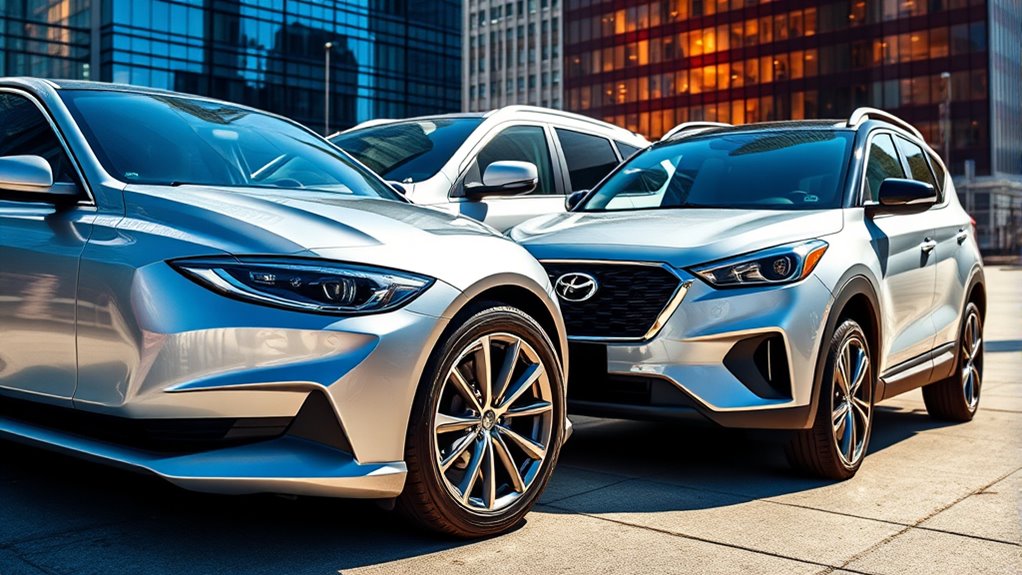
Deciding whether to lease or buy a car depends on your financial situation and driving habits. If you’re considering leasing, you’ll want to look for lease incentives that can make the deal more attractive, such as low or zero down payments, lower monthly payments, or special offers from manufacturers. These incentives are designed to encourage you to choose leasing over buying, making it easier to get into a new vehicle without a hefty upfront cost. Leasing often appeals to those who prefer driving brand-new cars every few years and want to avoid the long-term ownership costs that come with maintaining an older vehicle. With leasing, you’re typically responsible for routine maintenance, but the manufacturer’s warranty usually covers most repairs, which can help control unexpected expenses.
On the other hand, if you plan to keep your vehicle for many years, buying might be the smarter choice. While ownership costs can seem high initially, they tend to decrease over time, especially after paying off the loan. Once you own the car outright, you eliminate monthly payments, and the vehicle becomes an asset you can keep as long as it remains reliable. Although buying involves higher upfront costs, including a potential down payment and higher monthly payments, it also grants you the freedom to customize your car and drive as much as you want without worrying about mileage limits, which are often imposed on lease agreements. Plus, if you’re the type of driver who puts lots of miles on their vehicle annually, buying usually makes more sense, since lease contracts often have mileage restrictions that can lead to hefty penalties if exceeded.
When weighing your options, consider how ownership costs will impact your budget. Leasing might seem more affordable month-to-month, but over several years, the cumulative costs can surpass what you’d pay to own a car outright. Conversely, if you value flexibility and want to drive a new car every few years without the hassle of resale, leasing can be advantageous, especially with attractive lease incentives. Additionally, understanding credit scores and how they influence lease and loan approvals can help you secure better terms. Ultimately, your choice hinges on your financial priorities, how much you drive, and how long you want to keep your vehicle. If minimizing upfront costs and monthly payments is key, leasing could be the better route. However, if building equity and long-term savings matter more, buying offers the benefits of ownership and the potential to recoup some investment when you sell the vehicle later.
Frequently Asked Questions
How Does Leasing Affect My Monthly Budget Long-Term?
Leasing can lower your monthly budget upfront thanks to lease incentives that reduce payments. However, over the long term, it may cost more since you’re always paying for a new lease rather than owning the vehicle outright. To manage this, focus on purchase negotiations to get the best deal if you plan to keep the car. Consider how frequent upgrades and maintenance costs fit into your budget before choosing to lease long-term.
What Are the Hidden Costs Associated With Leasing?
While leasing may seem straightforward, hidden costs can catch you off guard. You might face lease end fees for excess wear and tear or exceeding mileage limits. Additionally, the residual value isn’t always accurate, meaning you could owe more if you choose to buy the car after the lease. These costs add up, making leasing more expensive than it appears on your monthly statement. Always read the fine print to avoid surprises.
Can I Customize a Leased Vehicle?
You can’t usually customize a leased vehicle through extensive modifications, but some lease agreements allow basic lease personalization like changing floor mats or adding accessories. Most leasing companies restrict major customization options because they want the vehicle returned in original condition. If you’re looking for more flexibility to personalize your vehicle, buying might be a better choice. Always check your lease terms for specific customization options allowed.
How Does Mileage Limit Impact Lease Options?
When considering lease options, keep in mind that mileage restrictions can influence your decision. Exceeding these limits often results in lease penalties, which can add unexpected costs. If you have a long commute or enjoy road trips, choose a lease with higher mileage allowances or negotiate flexible terms. Staying within the limits helps you avoid extra fees and keeps your leasing experience smooth and enjoyable.
What Are the Tax Implications of Leasing Versus Buying?
When you lease, you can often claim tax deductions on the monthly payments if you use the vehicle for business, but you don’t gain ownership benefits. Buying a vehicle lets you take advantage of ownership benefits like depreciation and potential tax deductions on interest and expenses. Consider your usage and financial goals to determine which option offers better tax advantages for your situation.
Conclusion
Ultimately, whether you lease or buy hinges on your lifestyle and dreams. Imagine the open road as a blank canvas—leasing offers fresh, vibrant strokes with lower payments, perfect for those craving variety. Owning, however, gives you the steady brushstroke of stability and freedom to customize. Think of your decision as choosing your own adventure; both paths lead somewhere meaningful. Whichever you pick, make it a journey that drives you closer to your passions.

